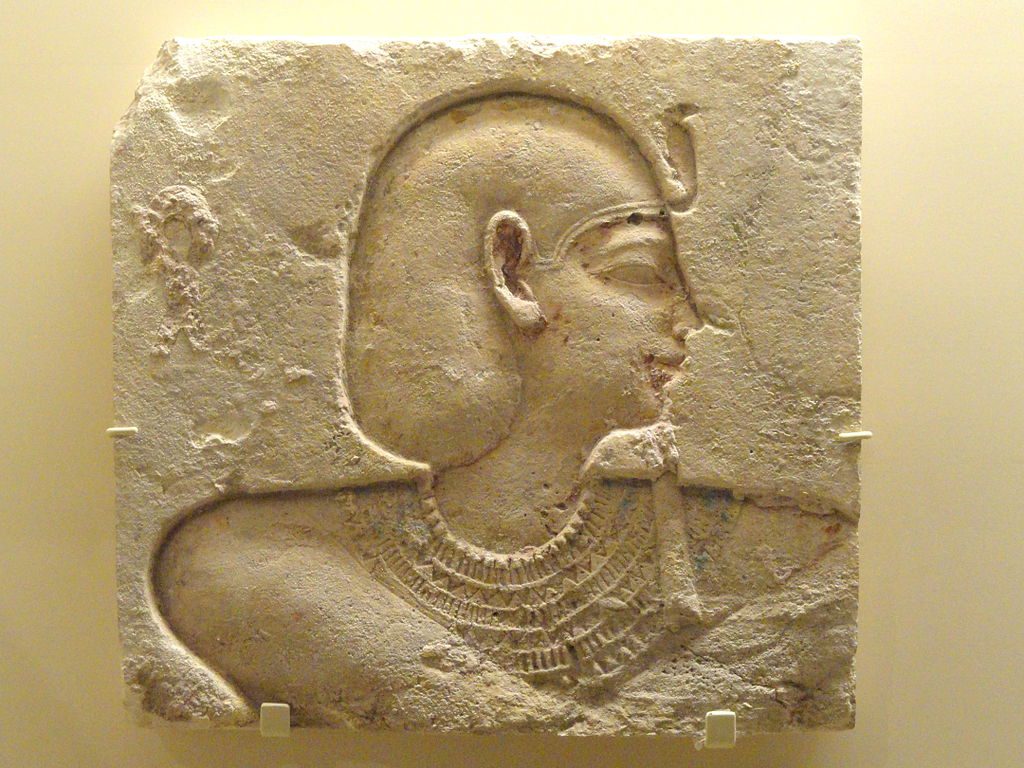In the late fourth century BCE, there was probably no person as opportunistic as Ptolemy I Soter, who served as one of Alexander the Great’s Generals until Alexanders death in 323 BCE. As news of his longtime companion, Alexander the Great’s, death became public, Ptolemy decided to take control of Alexander’s most valuable territory, Egypt. To do this, Ptolemy had to get the remains of Alexander’s dead body and bring it to Egypt in the hope to become Pharaoh.
Before the death of Alexander the Great, Ptolemy I was a Macedonian noble and one of Alexander’s seven Somatophylakes, the conqueror’s bodyguards. The later position was established after Alexander was almost killed in his sleep by his former guards. Alexander then put his seven most trusted companions in charge of his security to make sure no further attempts on his life. Ptolemy received his nobility from his mother, Arsinoe, due to her relation to the Macedonian Argead Dynasty.1 Very little else is known about the past of Ptolemy. Most of Ptolemy’s own claims about his past were probably fictitious and meant to garner credibility, respect, and legitimacy for the kingdom he built. One embellishment was the claim that Ptolemy was Phillip II of Macedon’s illegitimate son, which made him Alexander’s half-brother.2 Though there is minimal evidence of Ptolemy’s parents to support this claim, this being said to the Egyptians would be the type of thing that created an easy stairway to the throne for the founder of the Ptolemaic Dynasty.
As Alexander’s death became public knowledge, two main factions developed among his generals: those who believed Alexander’s empire should be kept intact after his death and those who did not. Ptolemy was in support of the latter, while another former general of Alexander, Perdiccas, firmly supported the former. Ptolemy’s continuous strategic instigation against Perdiccas led to a series of wars that divided Alexander’s Empire and created multiple new kingdoms.3
Ptolemy’s instigation begun when he tried to persuade his fellow generals to divide the Alexander’s land among themselves. He then marched his own arm to Egypt and simply declared himself governor of the country. This enraged Perdiccas since Perdiccas had already been chosen as regent to Alexander the Great’s infant son, Alexander IV. Out of the admiration and respect he held for Alexander the Great, Perdiccas believed the empire should be kept intact for the young.4 Ptolemy and the other generals that were on his side thought it was downright ridiculous to leave all the land Alexander conquered to a baby.
As Ptolemy adjusted to his life as leader of Egypt, he attempted to seize Alexander’s corpse from Macedonia and transport it to Alexandria.5 He appeared to have done this to anger Perdiccas, who wanted to place Alexander’s corpse in Macedonia in accordance with Alexander’s wishes. By angering Perdiccas, Ptolemy had Perdiccas right in the palm of his hands. Ptolemy realized that Perdiccas would make his next move emotionally rather than with reason. He was begging Perdiccas to attempt to attack Egypt because Ptolemy knew that he would win due to where he was located.
Playing right into Ptolemy, Perdiccas attempted to invade Egypt with his men. Ptolemy’s decision to defend the Nile River during Perdiccas’s attempts led to the fall of Perdiccas as he failed to invade Egypt on three separate attempts. His persistence to defeat Ptolemy caused the death of 2000 of his soldiers. As many of Perdiccas’s men became increasingly frustrated with his determination to defeat Ptolemy, they decided to revolt against their leader and murder Perdiccas.
While many of the other generals were determined to conquer more land, Ptolemy’s priority was having Egypt. However, this did not stop him from attempting to gain control of Libya, Syria, and Cyprus. This started after Seleucus I went to Egypt for asylum after Antigonus the One-Eyed successfully invaded Seleucus’s land of Babylon. At the time, Antigonus and his son, Demetrius I were power-hungry and were seen as the most powerful among the Diadochi (this was solidified by the fact that Antigonus had never lost a battle by that point). Ptolemy, though careful as ever, was bent on defeating the father-son duo, giving Seleucus his land back, and getting some more land for himself as well. He and Seleucus defeated Demetrius in the Battle of Gaza, which gave Seleucus his land of Babylon back, and Ptolemy took control of Syria (though control of Syria continued to go back and forth between Ptolemy and Antigonus).

During the early and middle stages of Ptolemy and Antigonus’s rivalry, there was no clear favorite as they traded off victories due to Antigonus’s war expertise and Ptolemy’s political and strategic skills. After a quick attempt at peace between the two rivals, Ptolemy ended the tranquility by directly commanding a fleet to conquer the towns of Lycia and Caria from Antigonus. Ptolemy invaded Antigonus’s land in order to enrage the leader of the Antigonid Empire and to goad him to act emotionally rather than strategically.
Initially, Ptolemy’s devious plan seemed to have backfired on him as Antigonus and Demetrius successfully conquered Ptolemy-controlled Cyprus. In spite of this success, Antigonus’s greed led to the beginning of his downfall as he attempted to invade Ptolemy’s center of power, Egypt. Mimicking his strategy against Perdiccas, Ptolemy successfully defended Egypt against the Macedonian general by protecting the Nile. After Antigonus’s failed attempt, Ptolemy came to the realization that simply staying in Egypt and being as far from the war as possible was the best thing for him to do. This was due to the aforementioned priority that Ptolemy had for Egypt. Ptolemy also wanted to avoid making himself a target by flying under the radar. However, Ptolemy still took more modest actions, such as helping out allies when they were attacked. An example of this being Demetrius’s unsuccessful attempt to siege the allied island of Rhodes. Ptolemy protected Rhodes, and the people of Rhodes returned the favor by conferring on Ptolemy the name, Soter, which means savior.

By this time, Ptolemy had joined Seleucus I, Lysimachus, and Cassander in a coalition against Antigonus and Demetrius. Thinking strategically, Ptolemy, for the most part, remained as far as possible from the war, leaving it up to the rest of the coalition to do the actual fighting. Though he would did repeatedly attempt to take back control of Syria whenever Antigonus was battling any of the other three members of the coalition. Ptolemy conquered and lost Syria three times during the war. This would continue until 301 B.C. in the Battle of Ispus, where an 81-year-old Antigonus not only suffered his first battle defeat but was killed during the battle as well.6 The death of Antigonus led to Ptolemy occupying Syria for the fourth time. However, Ptolemy did not keep the land and decided to give the Syrian land to Seleucus as a prize for his hard work in the Battle of Ispus and because Ptolemy had contributed far less to the war effort than Seleucus had. Nevertheless, the Ptolemaic Dynasty continued to covet Syria, and this led to many future wars between the Ptolemaic and Seleucid Dynasties over the land.7
Ptolemy’s later years were far less eventful, as he was content with just having Egypt. He turned Alexandria into a cultural and intellectual center by building an enormous library and museum and making the Egyptian city the most populous city in the Mediterranean at that time. Ptolemy also insulated Alexandria from native Egyptian culture, and made sure that the city was fundamentally Greek in character.

Eventually, Ptolemy began to step away from power by by making his son, Ptolemy II Philadelphus, his co-regent. This arrangement continued until Ptolemy I’s death in 282 B.C. at the age of 84. After his death, Ptolemy I was deified by the Egyptian people, and a festival was created in his honor. He was able to pass down a stable and profitable kingdom to his son, who also enjoyed a successful reign.
Ptolemy could be considered by far, the most successful out of the former generals of Alexander the Great. Ptolemy’s calm demeanor and ability to make his rivals emotionally vulnerable through his actions was incredibly effective. His ability to maneuver politically and strategically out of complicated situations allowed him to a strong foundation for the Ptolemaic Dynasty. That dynasty, which ruled Egypt for almost three centuries, was arguably the richest, most powerful, and most influential of the regimes that succeeded Alexander the Great. It was also the longest-lived of the empires founded by Alexander’s fomer generals.
- Walter M. Ellis, Ptolemy of Egypt (London: Routledge, 1994) 32. ↵
- Walter M. Ellis, Ptolemy of Egypt (London: Routledge, 1994) 39. ↵
- Victor Alonso Troncoso and Edward M. Anson, After Alexander: The Time of the Diadochi (323-281 BC) (Cowley Road: Oxbow Books, 2013), 163. ↵
- Rudolf Pfeiffer, History of Classical Scholarship, from the Beginnings to the End of the Hellenistic Age (Oxford: Clarendon P., 1968) 234. ↵
- Michael Gagarin, “Ptolemies”, The Oxford Encyclopedia of Ancient Greece and Rome (Oxford: Oxford University Press, 2010) Accessed Sept. 11, 2019 https://www.oxfordreference.com/view/10.1093/acref/9780195170726.001.0001/acref-9780195170726-e-1068. ↵
- Dorothy J. Thompson and Albert Brian Bosworth, The Oxford Companion to Classical Civilization (Oxford: Oxford University Press, 2014) ↵
- J.G. Manning, The Last Pharaoh: Egypt Under the Ptolemies, 305-30 BC (Princeton: Princeton University Press, 2010), 37. ↵




7 comments
Vincent Villanueva
Ptolemy I Soter was most definitely one successful individual who was determined to get what he wanted. His strategies to defend their people, but also give back to them truly showed what the character who once served under Alexander The Great was capable of. I do believe the Ptolemy was one of the important generals in history by understanding the limits of all armies and how to overcome them. The way he brought of Perdiccas into a war no one desired showed his ability to do this. Him acting ruthless when needed especially in this particular situation with dealing with the Perdiccas shows that he wouldn’t let anyone make him look weak. All in all, this was a great article. Thank you, Mr. Martinez-Milland.
Karla Fabian
This is a very detailed article that describes Ptolemy and his strategies. Prior to reading this article. It was very interesting to read how a calculated person he was, as he was very meticulous when it comes to detail and the precision of strategies. It was very intriguing to read how he was able to anticipate that Perdiica’s plan to invade Egypt was going to fail, the majority of the time. Moreover, it was interesting to read how Ptolemy began to step away from his power by making his son, and how his death created a festival in his honor.
Margaret Cavazos
I’ve had a curiosity about the transition between Alexander the Great’s empire and the Ptolemaic dynasty and this article gave me all the information I was lacking. It is sad that the people Alexander trusted with his safety went directly against his wishes in order to gain power for themselves. Ptolemy’s skill in battle was shown when he drew another of Alexander’s guards, Perdiccas, to Egypt to fight, knowing that he would be far from his home territory and fight emotionally rather than strategically. Perdiccas was the general that wanted Alexander’s kingdom to remain intact and according to his wishes. Since Perdiccas saw Alexander’s son losing his birthright and the other generals becoming power-hungry, he was angry and fought emotionally, which led to mutiny and his death. This article was very interesting and I liked the detail to battle strategy as well as insight into each person and their reasoning as to why they acted in the manner that they did.
Davis Nickle
I feel the Ptolemy was probably one of the most prudent general of his time understanding not only the limits of his army but also understanding the limits of his enemies army. His baiting of Perdiccas into an unfavorably war shows this aspect first hand, also his ruthlessness in dealing with and manipulating Perdiccas shows that he wouldn’t let anyone stop him from getting the power he wanted.
Eliezer Leal
What a great article. I don’t know much about Ptolemy but it seems that he was a very calculated person. How he was able to predict that Perdiiccas would fail in his attempt to invade Egypt, not just once but three times, its crazy. Even joining the coalition was well thought as to save his resource so that he may take control of Syria when he had the chance.
Vania Gonzalez
This was a very good article I really enjoyed it and you did a really good job at explaining Ptolemy’s rule and his strategies in detail. The Ptolemy name is very well known in my opinion and they ruled for quite some time and very successfully they were popular with their people and it really shows in the article how they not only defended their people but also gave back to them in some way. It was a smart tactic that Ptolemy used to conquer and defeat his enemies, not many this about the emotional side of things when they are plotting against someone but he did and that really worked for him.
Charli Delmonico
This was such an interesting article! I thought that all of Ptolemy’s battles and acquisitions were explained in great detail, and everything in the article flowed quite well. I had no idea that Ptolemy had conquered so may places and had remained the ruler of Egypt during so many battles. I think it is smart that he used the same strategy multiple times to make his enemies attack based on emotionally decisions rather than logical ones.